
Related
Topics
Guests
- Mohammed Omeraward-winning Palestinian journalist reporting in Gaza City. Follow him on Twitter: @mogaza.
The Palestinian death toll in Gaza has topped 1,800 as the Israeli offensive enters its 28th day. On Sunday, at least 10 people died when Israel shelled another United Nations school sheltering Palestinian civilians. The United States has called the attack “disgraceful,” while U.N. Secretary-General Ban Ki-moon condemned it as a “moral outrage and a criminal act.” It was the seventh U.N. school hit since Israel’s offensive began. The United Nations, meanwhile, is warning of a “rapidly unfolding” health crisis in Gaza as large parts of the territory remain without power or running water, and around 400,000 are displaced. More than 200 Palestinians have been killed since a 72-hour ceasefire collapsed on Friday. Over the weekend, the Israeli government admitted that a soldier it had reported as captured was actually killed in battle. Earlier today, Israel announced a unilateral seven-hour truce in most of the Gaza Strip, except for Rafah. Palestinians have already accused Israel of breaking its own ceasefire by launching deadly attack on the Shati refugee camp. We go to Gaza City to speak with Mohammed Omer, an award-winning Palestinian journalist who has family in Rafah.
Transcript
AMY GOODMAN: The Palestinian death toll in Gaza has topped 1,800 as the Israeli offensive enters its 28th day. On Sunday, at least 10 people died in an Israeli airstrike near the entrance of a United Nations school sheltering Palestinian civilians. The United States called the incident “disgraceful.” U.N. Secretary-General Ban Ki-moon called it a “moral outrage and a criminal act.” Seven U.N. schools have now been hit since Israel’s offensive began. Chris Gunness is spokesman of the U.N. Relief and Works Agency for Palestine Refugees.
CHRISTOPHER GUNNESS: There is no evidence whatsoever that there were militants inside the school. There’s no evidence that there were militants firing rockets from inside the school. In international law, you have to distinguish between combatants and noncombatants. You have to consider the proportionality: Is the risk of civilians being killed worth it?
AMY GOODMAN: We’ll go to Christopher Gunness in a moment in Jerusalem. But earlier today, Israel announced a unilateral seven-hour truce in most of the Gaza Strip, except for Rafah. Palestinians have already accused Israel of breaking its own ceasefire by launching a bomb attack that killed an eight-year-old girl and wounded 29 other people in the Shati refugee camp. Just before the ceasefire began, an Israeli airstrike killed a leader from Islamic Jihad.
Meanwhile, Hamas has accused Israel of misleading the world about the alleged capture of an Israeli soldier. On Friday, Israel said one of its soldiers, Lieutenant Hadar Goldin, had been captured near Rafah. His suspected abduction led to an Israeli offensive in Rafah that killed over 100 people and the collapse of a U.S.- and U.N.-brokered ceasefire. On Sunday, Israel announced Goldin had been killed in battle. Sixty-three Israeli soldiers and three civilians in Israel have now been killed in the past four weeks.
Meanwhile, in Washington, Congress has approved $225 million in emergency funding for Israel’s Iron Dome missile defense system. The Senate approved the measure unanimously. The House approved the funding by a 395-to-8 vote.
We go now to Gaza City, where we’re joined by Mohammed Omer, the award-winning Palestinian journalist.
Mohammed, your family is from Rafah. We spoke briefly on Friday. Can you talk about what’s taken place over the weekend?
MOHAMMED OMER: The situation in Rafah is still terrifying at the moment. As we see in the background, this is Gaza City. In Gaza City, we have about two hours left of the ceasefire that the Israeli government announced just late last night. But that also excludes the southern part of the Gaza Strip and mainly Rafah refugee camp. Rafah is living under very dire circumstances. I have been in touch with my grandmother, who was telling me that the situation in Rafah is pretty much close to al-Nakba, in the catastrophe and the damage and the same scenes of people and the same dead bodies that she is able to see in her neighborhood.
People are reaching a level in Rafah refugee camp to put the bodies of their victims inside refrigerators. Vegetable refrigerators are now filled of bodies of human beings in the southern part of the Gaza Strip, and those are filled. And this morning we are seeing also more and more ice cream freezers are filled with children. One of the children is Noor. She’s under two months. She was just killed by a Israeli missile 24 hours ago, and her body is still inside one of these ice cream freezers.
The situation in the southern part of the Gaza Strip is rather terrifying, with a lot of people who are injured and still on the ground waiting for ambulances to pick them up. Now, hospitals are not able to cope, because Abu Youssef al-Najjar Hospital has come under fire, and the other hospital, which is supposed to be for maternity, is functioning, but only for a few cases. So, dead bodies are on the streets at the moment. Nobody is able to evacuate them. I have talked to some health officials who informed me that there is about 300 people who were killed in the last three days in Rafah alone and over 1,000 who have been injured.
The border of Rafah has witnessed a lot of damages caused by the Israeli military bombardment. The F-16 missiles are still continuing until this moment, where everything that moves within Rafah can be a target. I have been also talking to the mayor of Rafah, Subhi Radwan, who also informed me that about 30,000 to 40,000 inhabitants in Rafah, they have no access to water, and they have no access to electricity. They have been trying to call the International Red Cross, and the International Red Cross is not responding to any phone calls from citizens. There is a lot of criticism from the local population in Rafah that the International Red Cross is not responding, is not taking phone calls of people. And people are just at a loss of who would they call and turn to in times of a crisis when they need help.
AMY GOODMAN: Mohammed Omer, what about this—what is it? A seven-hour pause? And the attack that is being alleged that the Israeli military engaged in?
MOHAMMED OMER: Now, the bomb attack actually happened just a few minutes after the ceasefire started. The ceasefire started at 10:00. It’s about 11 or 12 minutes. Then a bomb attack in the west of Gaza City hit 30 people, and 29 of them were injured. Most of them were children. And one eight-year-old girl was killed. This is the only violation which I have seen, actually, today, which in my view is quite a progress, even though there are 29 children who are injured and one who’s killed.
But still, Gaza Strip is quite cautious. People are not really getting outside on full capacity as they would want to. We see in the background here some people are moving. Usually this street is quite empty. But now people are just getting outside. Some of them are getting outside for humanitarian reasons. Other ones, they are getting outside to bury their relatives and loved ones. And there are also families who are going outside to get medical supplies, food, water and whatever they need to come to—in order to face the coming days. People are expecting this war to continue in Gaza, as Israel seem not to be in Cairo together with the Palestinian factions to reach a long-term solution or ceasefire.
AMY GOODMAN: Mohammed Omer, the pause that the Israeli military has announced does not include Rafah. For the geographically challenged, can you explain where Rafah is, but also the geopolitical significance of Rafah and why they’re continuing to attack through this period?
MOHAMMED OMER: Now, Rafah refugee camp is in the far southern part of the Gaza Strip. It has about 180,000 inhabitants, a border with Egypt. And Rafah has two important sites. One of them is the Rafah crossing. Even though the Egyptian authorities announced the Rafah crossing is open, but still the Palestinian Authority and the Palestinian border control say that their staff members cannot reach the Rafah crossing, so it means they cannot evacuate injured bodies. They cannot make people access to leave, because it’s simply difficult for them to work and function on full capacity when there are gunfires and artillery shelling are fired at Rafah crossing. Now, that’s one. And the other site of Rafah crossing is Kerem Shalom, which is the commercial crossing, where—which is basically all the materials and the food and the supplies that get into the Gaza Strip is through the Israeli-controlled commercial crossing.
Now, this is—if Rafah has been attacked like this, then people will start to realize, in Gaza City here, that the situation is going to hit them very soon. You find hundreds of people who are in lines waiting to get bread in the bakeries, and they just want to get that just before the two hours finish, in the next two hours. And that’s quite complicated to do that, because I have been, myself, to get some bread in Gaza City, and you’re talking about at least half a day of waiting to get bread in the last few hours, and you may not be able to get it. There are also other people who are going to find water, and they cannot.
So, Rafah is a very central entry point for people who exit and enter into the Gaza Strip. And it’s very important that Rafah also is considered to be the lifeline for a long time through the tunnels. The tunnels have been completely shut in the last few months. And the situation in the southern part of Gaza Strip is now more tightened, because even humanitarian aid groups who are coming to the Gaza Strip to help the Palestinians, they are not allowed into the Gaza Strip, because they feel unsafe to come under gunfire.
The situation in Rafah is quite deteriorating at this moment. There are people who are appealing to ambulances at this moment, as we speak, and there are no ambulances that can get into the area and no ambulances that can evacuate the bodies. People cannot get in outside of the Rafah area. The Rafah area is under constant bombardment and constant siege, and it’s been isolated completely from the rest of the Gaza Strip. And I take this sign as a very alarming sign that if this is going to continue, we are going to expect more and more massacres. Talking about massacres, the family of al-Ghoul family, the man who is a 63-year-old man who was killed by an Israeli F-16 missile in Yebna refugee camp, and killing other nine family members from his home, including one child, Youssef, who’s only about two months.
AMY GOODMAN: Mohammed Omer, very quickly, the public health crisis in Gaza right now, can you talk about the electricity and the water? And the warnings about diseases—the water, the electricity, the possibility of disease, waterborne diseases?
Well, we are going to have to leave it at that, because it looks like Mohammed Omer just lost our audio feed to Gaza City. Mohammed Omer is the award-winning Palestinian journalist reporting in Gaza City. He tweets at the handle Mogaza.
This is Democracy Now! When we come back, we’re going to Jerusalem to speak with the U.N. spokesperson, Chris Gunness, about the attack on yet another shelter that is run by the United Nations in which Palestinians have taken refuge. Stay with us.

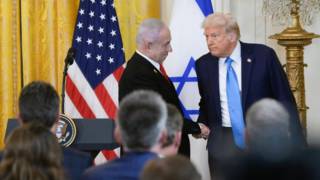
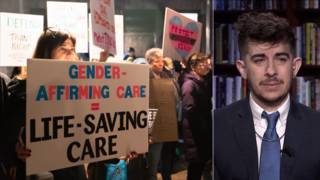
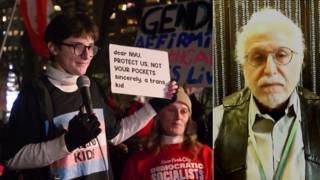
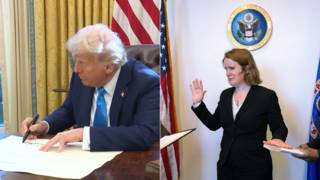





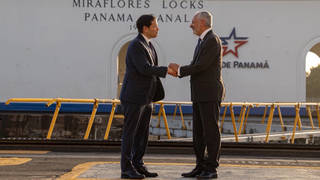
Media Options